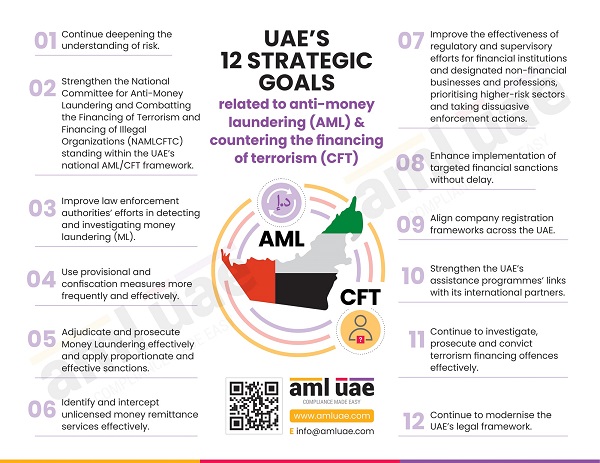A guide to Anti Money Laundering AML Laws in UAE | 2024
It is critical to combat money laundering and terrorism financing and safeguard the economy.
As part of the UAE government’s efforts to fight these financial crimes, AML/CFT regulations have been issued, supported by the detailed guidelines issued by various supervisory Authorities, laying down the principles and best practices necessary to identify the financial crime instances and mitigate the risks. Here is the comprehensive guide to Anti-Money Laundering (AML) Laws in UAE for DNFBPs.
The Legal Framework:
The principal AML/CFT legislation applicable are:
- Federal Decree-Law No. (20) of 2018 On Anti-Money Laundering and Combating the Financing of Terrorism and Financing of Illegal Organisations (as amended by Federal Decree Law No. (26) of 2021),
- Cabinet Decision No. (10) of 2019 Concerning the Implementing Regulation of Decree-Law No. (20) of 2018 On Anti-Money Laundering and Combating the Financing of Terrorism and Illegal Organisations (as amended by Cabinet Resolution No. (24) of 2022).
Apart from the above, one needs to adhere to the following legislation:
- Cabinet Decision No. (58) of 2020 Regulating the Beneficial Owner Procedures,
- Cabinet Resolution No. (53) of 2021 Concerning the Administrative Penalties against Violators of The Provisions of the Cabinet Resolution No. (58) of 2020 Concerning the Regulation of Beneficial Owner Procedures,
- Cabinet Decision No. (16) of 2021 Regarding the Unified List of the Violations and Administrative Fines for the Said Violations of Measures to Combat Money Laundering and Terrorism Financing that are Subject to the Supervision of the Ministry of Justice and the Ministry of Economy,
- Cabinet Resolution No. (74) of 2020 regarding the Terrorism Lists Regulation and Implementation of UN Security Council Resolutions on the Suppression and Combatting of Terrorism, Terrorist Financing, Countering the Proliferation of Weapons of Mass Destruction and its Financing, and Relevant Resolutions,
AML Law in UAE
The AML Law in UAE applies to financial institutions, banks, insurance companies, Designated Non-Financial Businesses and Professions, and Virtual Asset Services Providers (VASPs). These Designated Non-Financial Businesses and Professions (DNFBPs) include:
- Dealers in precious Metals and Stones
- Real Estate Agents and Brokers
- Trust and Corporate Service Providers
- Auditors & independent Accountants
- Lawyers, Notaries & Other Legal Professionals
Checklist of the core AML Regulation in UAE
Here is the checklist of the core AML/CFT obligations entrusted upon the DNFBPs by the UAE AML Laws:
- Have you registered yourself with goAML Portal?
- Do you have a competent AML/CFT Compliance Officer to manage your AML compliance?
- Have you identified and assessed your business’s exposure to ML/FT risks?
- Are your AML/CFT policies, procedures, and controls effective and aligned with AML/CFT laws and Enterprise Wide Risk Assessment (EWRA)?
- Is your Customer Due Diligence process well-defined?
- Is your implementation of Targeted Financial Sanctions (TFS) effective?
- Have you assessed your customers’ risk, considering relevant ML/FT risk factors?
- If classified as “high-risk”, what Enhanced Due Diligence measures do you apply?
- Do you have a set process to identify and report Suspicious Transactions and other relevant reports on the goAML Portal?
- Do you retain all your AML/CFT records for at least 5 years?
Here is a ready reckoner for covering the list of relevant AML/CFT regulations and overall AML compliance obligations imposed on the DNFBPs and detailing each such regulatory requirement.
Let’s join hands and fight against these financial crimes, stay compliant with AML/CFT regulations and avoid the penal consequences of non-compliance.
Share via :
Our recent downloads
side bar form
Share via :
FAQs About UAE AML Law
The Anti-Money Laundering and Combating the Financing of Terrorism Supervision Department (AMLD) under the Central bank of UAE (CBUAE) enforces the UAE anti-money laundering laws and regulations and AML/CFT Guidelines 2021.
The Central Bank of UAE (CBUAE) regulates AML in the UAE. Earlier, it was handled by a dedicated department – Banking Supervision Department. In 2020, CBUAE established the Anti-Money Laundering and Combatting the Financing of Terrorism Supervision Department (AMLD).
Federal Decree No. (20) of 2018 on Anti-Money Laundering and Combating the Financing of Terrorism and Financing of Illegal Organisations is the key regulation of the UAE’s AML/CFT efforts. Cabinet Decision No. (10) of 2019 is the implementing regulation of the Federal Decree No. 20 of 2018.
Suppose a person transfers or moves the proceeds to conceal the illegal source, disguises the nature and location of proceeds, uses illicit money, or assists someone with money laundering activities. In that case, there is life imprisonment of fewer than ten years and a fine of at least AED100,000.0, but not more than AED500,000.
Money laundering and terrorism financing are illegal activities that generate illicit money disguised as legal money worldwide. That is why countries introduce anti-money laundering laws and anti-money laundering policy to fight money laundering.
About the Author
Pathik Shah
FCA, CAMS, CISA, CS, DISA (ICAI), FAFP (ICAI)
Pathik is a Chartered Accountant with more than 25 years of experience in compliance management, Anti-Money Laundering, tax consultancy, risk management, accounting, system audits, IT consultancy, and digital marketing.
He has extensive knowledge of local and international Anti-Money Laundering rules and regulations. He helps companies with end-to-end AML compliance services, from understanding the AML business-specific risk to implementing the robust AML Compliance framework.

